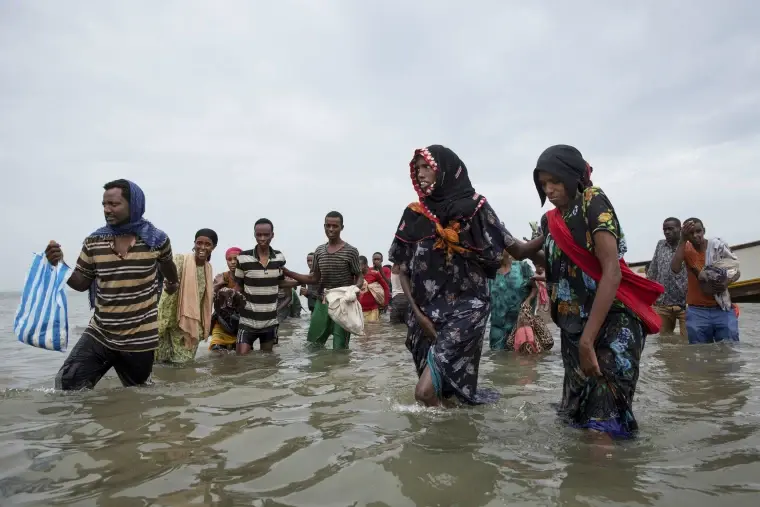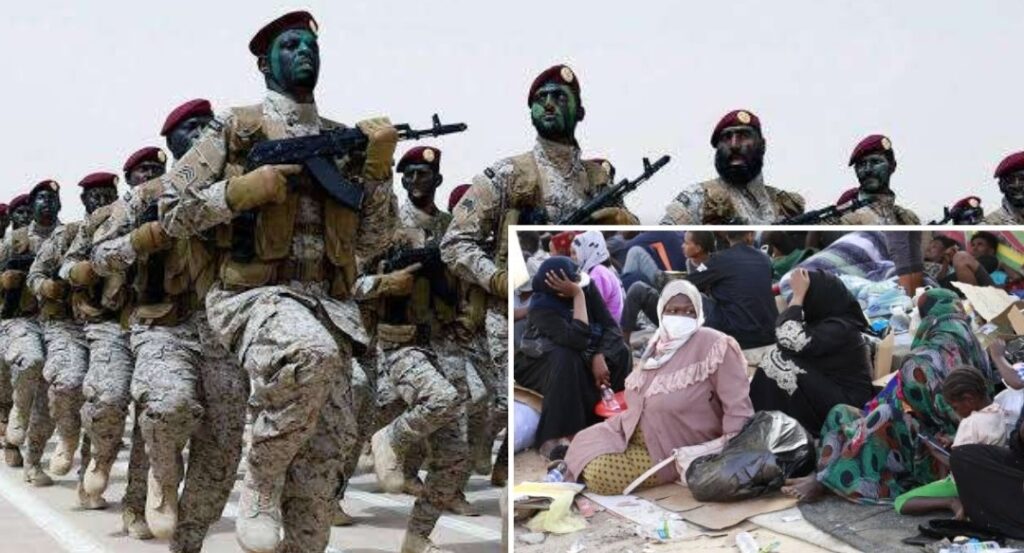Mass Killings, Migrant Vulnerability, And The Quest For Justice
Amidst the vast and unforgiving expanses of the Yemeni desert, a profoundly distressing tragedy has unfolded, sending shockwaves reverberating across the global conscience. Reports from multiple sources, including the distinguished Human Rights Watch and Reuters, have laid bare a horrific incident, alleging the involvement of Saudi border guards in the mass killings of hundreds of Ethiopian migrants who embarked on a perilous journey with the hope of reaching Saudi Arabia.
This deeply harrowing incident stands as a stark reminder of the desperate plight faced by migrants who courageously seek refuge and a better life. In the unforgiving terrain of the Yemeni-Saudi border, a humanitarian crisis of staggering proportions has unfolded silently, away from the world’s gaze. Saudi border guards now face grave allegations of the mass killings of hundreds of Ethiopian migrants and asylum seekers who endeavoured to cross into Saudi Arabia during the period spanning from March 2022 to June 2023. Disturbingly, as Human Rights Watch contends, these killings appear to persist even as we put pen to paper, revealing a deeply troubling pattern of violence.
To grasp the enormity of this tragedy, one must first understand the journey embarked upon by these migrants. Originating from the Horn of Africa, these individuals embark on an arduous odyssey across the Gulf of Aden, through Yemen, and finally, to Saudi Arabia. Driven by a combination of economic aspirations and the desperate need to escape dire human rights abuses in Ethiopia, these migrants find themselves ensnared in a web of exploitation and brutality. We delve into the motivations behind this perilous voyage and the horrific ordeals endured along the way.
Central to this tragic narrative are the ruthless smugglers and traffickers who prey on the vulnerability of these migrants. Physical assaults, extortion, and unspeakable cruelty become tools of coercion as these criminals extract payments from family members or contacts in Ethiopia or Saudi Arabia. This section unveils the harrowing experiences faced by migrants as they fall victim to the merciless grip of these nefarious networks.
The armed conflict in Yemen, which has raged on since 2014, casts a long and dark shadow over the plight of these migrants. The Yemeni government and Houthi armed group have detained migrants in squalid conditions, subjecting them to unthinkable abuse. Torture, extortion, and deportation to treacherous sea conditions are disturbingly common occurrences. We shed light on the suffering endured by migrants who find themselves ensnared in this conflict-ridden land.

The heart of this crisis lies in the alarming escalation of violence documented in this report [2]. The pattern of abuse has shifted from sporadic shootings and mass detentions to systematic and widespread killings, potentially constituting crimes against humanity if proven to be part of a state policy [2]. We explore the chilling testimonies of survivors who recount explosive weapon attacks, shootings at close range, and unimaginable horrors. The consequences of these attacks, from dismemberment to severe injuries, create a landscape of despair.
The international community has not remained silent in the face of these shocking revelations. Calls for accountability and justice resound across the globe. We delve into the actions taken by governments, international organizations, and activists to seek justice for the victims and to prevent further atrocities. The urgent need for a UN-backed investigation is emphasized, as well as the potential suspension of arms transfers to Saudi Arabia.
This article would be incomplete without addressing Saudi Arabia’s image-building efforts on the international stage. The juxtaposition of these extravagant endeavours with the alleged mass killings raises critical questions about the kingdom’s responsibility and moral standing. We dissect the implications of this crisis on Saudi Arabia’s global reputation and its relations with neighbouring nations.
Drawing from the comprehensive and emotionally charged report by Human Rights Watch, we paint a vivid and heart-rending picture of that fateful day when Ethiopian migrants faced brutal force. Through gripping survivor accounts and the harrowing recollections of eyewitnesses, we uncover the horrors that unfolded on that scorching desert day.
The global community swiftly responded to the allegations of mass killings, expressing outrage and condemnation. This section highlights the role of international organizations, governments, and tireless activists in seeking justice and advocating for the safety and rights of migrants. It also delves into the diplomatic implications and the responses of various nations and organizations.
To better understand the broader implications of this incident, we delve into the systemic vulnerabilities that migrants face on perilous journeys. Our examination includes the perils of human trafficking, and exploitation, and the urgent need for comprehensive policies that safeguard the rights and dignity of these vulnerable individuals. We explore the psychological toll of migration and the challenges faced by survivors.

In the interest of providing a balanced perspective, we present Saudi Arabia’s official response, as reported by Reuters, where they firmly reject accusations of involvement in the alleged killings. We also delve into the potential repercussions of such an incident on Saudi Arabia’s reputation and its relations with neighbouring countries. The geopolitical dimensions and the impact on regional stability are also examined in depth.
As this article nears its conclusion, we discuss the resounding calls for action reverberating across the international stage. We underscore the urgent need for collaborative efforts to prevent such harrowing tragedies from recurring in the future. Our analysis emphasizes addressing the root causes of migration and forging safer pathways for those who are driven to seek refuge and a brighter tomorrow. We delve into the legal avenues for seeking justice and accountability for the alleged perpetrators.
The Human Rights Watch report brings to light the disturbing fact that if these killings are part of a Saudi government policy to murder migrants, they may constitute a crime against humanity. We analyse the implications of such a grave accusation and the international legal mechanisms that can be employed to hold those responsible accountable.
Sources
- https://www.reuters.com/world/middle-east/saudi-border-guards-killed-hundreds-ethiopian-migrants-hrw-says-2023-08-21/
- https://www.hrw.org/news/2023/08/21/saudi-arabia-mass-killings-migrants-yemen-border
- https://www.hrw.org/report/2023/08/21/they-fired-us-rain/saudi-arabian-mass-killings-ethiopian-migrants-yemen-saudi
- https://guardian.ng/news/saudi-border-guards-killed-hundreds-of-ethiopian-migrants/
- https://www.vanguardngr.com/2023/08/how-saudi-border-guards-killed-hundreds-of-ethiopian-migrants-human-rights-watch/




